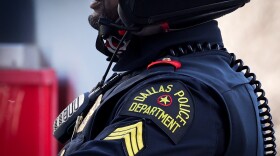Dallas police officials asked the city council for its blessing to hire 300 more police officers — but said trying to hire any more could be too costly and affect current patrol staff.
The conversation over staffing levels comes after Dallas voters approved a controversial charter amendment last year that set a police hiring mandate. Just how many officers the city can recruit, hire and train has been the source of disagreement inside — and outside — of City Hall.
“Right now, as we stand with the hiring goal of 300, I can keep all of my resources where they’re at,” Interim Police Chief Michael Igo said during Wednesday’s council meeting.
But if that number goes any higher, Igo said, it could affect other aspects of the police department.
“There’s no doubt in my mind,” Igo said. "Either from a response time, and I could even make an argument, even from a violent crime standpoint, we would see negative impacts from both those areas."
More officers could mean a need for more trainers. If so, that could reduce the number of people out on the streets patrolling.
When asked what the total financial impact could be — from recruiting and training costs, equipment for new officers and even facility space to house them — city staff didn’t have a firm answer.
That lack of clarity raised concerns for District 11 Council Member Jaynie Schultz
“I think it would be fiscally irresponsible to do anything other than to fully understand the financial impact of this,” Schultz said.
Voters passed Proposition U in November. The new charter amendment requires the city to hire at least 900 more uniformed police.
The group responsible for getting the proposition on the ballot, Dallas HERO, accused the city council of not doing enough to keep the city safe and argued violent crime rates required a boost to the department ranks. The groups major donor is involved in other conservative political movements in North Texas.
Critics say the mandate puts the city on the hook for millions in additional spending to hire new officers, and DPD data shows violent crime in the city has dropped three years in a row. A coalition of current and former local, regional and state officials joined forces to oppose the proposition.
Nonetheless, voters narrowly approved Prop U with just over 50% of the vote and gave the city a mandate, said District 12 Council Member Cara Mendelsohn, who chairs the city’s Public Safety Committee.
“There’s not a person around this horseshoe that didn’t say don’t vote for that,” Mendelsohn said. “But it passed — and it passed because the residents are telling us very clearly, they want more police officers.”

The city’s current hiring goal is 250 officers — and there's already a budget gap of $5.4 million to achieve that. It’ll cost $10 million to get the staffing level to 300 officers, and just over $12 million to hire 325, according to police officials.
In the meantime, the department is also trying to cut down on costs.
Police officials told the council the department’s overtime expenses, which have been a financial issue in recent years, dropped about 9%. They credited monitoring overtime as a top priority in staff meetings.
The department also credited renovating some patrol stations. Dallas Police Department Assistant Director Martin Riojas said it came down to fixing security gates — the department spent money on overtime for officers to guard outside those stations.
“Last year at this time, we had about $1.2 million dollars that we were spending on station security, because our gates were in disrepair and not functional,” Riojas said.
When it comes to recruiting and retention, the department's trying out a handful of initiatives. Those include a referral program that could result in an officer getting $5,000 for steering a recruit to the department, and a sick time exchange program that allows officers with the department for at least two years to exchange sick hours for pay.
Right now, there are 566 officers who have received these payments — and about 30 more under review. Police officials told the council the program would cost nearly $2 million to fund.
Another incentive program could earn an officer who's been with the department for more than 30 years a one-time payment of $40,000. The initiative started in 2023 and those veteran officers should see the payouts in May of this year.
DPD budgeted that incentive for 70 officers. Of those, 69 were deemed eligible and only 63 are still serving. If all those officers make it to the end of their terms, it could cost the city $2.5 million.
Along with what some inside City Hall call a "policing crisis," Dallas is without a permanent police chief.
Igo took over in the interim after former Dallas Police Chief Eddie Garcia left to become an assistant city manager in Austin.
The city announced a national search for a permanent candidate at the end of January.
Got a tip? Email Nathan Collins at ncollins@kera.org. You can follow Nathan on Twitter @nathannotforyou.
KERA News is made possible through the generosity of our members. If you find this reporting valuable, consider making a tax-deductible gift today. Thank you.




